- Home
- Gail Carson Levine
Fairies and the Quest for Never Land
Fairies and the Quest for Never Land Read online
Text by Gail Carson Levine
Art by David Christiana
Copyright © 2010 Disney Enterprises, Inc.
All rights reserved. Published by Disney Press, an imprint of Disney Book Group. No part of this book may be reproduced or transmitted in any form or by any means, electronic or mechanical, including photocopying, recording, or by any information storage and retrieval system, without written permission from the publisher. For information address Disney Press, 114 Fifth Avenue, New York, New York 10011-5690.
ISBN 978-1-4231-6538-5
Visit www.disneyfairies.com
Table of Contents
One
Two
Three
Four
Five
Six
Seven
Eight
Nine
Ten
Eleven
Twelve
Thirteen
Fourteen
Fifteen
Sixteen
Seventeen
Eighteen
Nineteen
Twenty
Twenty-One
Twenty-Two
Twenty-Three
Twenty-Four
Twenty-Five
Twenty-Six
Twenty-Seven
Twenty-Eight
Twenty-NIne
Thirty
Thirty-One
Thirty-Two
O N E
“GWENDOLYN Jane Mary Darling Carlisle,” Grandma cried, putting down her teacup with trembling fingers, “you are Wendy Darling returned to life.”
For her seventh birthday, Gwendolyn had come to breakfast wearing a white dress trimmed with eyelet lace.
“Fetch the scrapbook from my lower bureau drawer, dear,” Grandma said. “I want to see.”
Gwendolyn returned with a leather scrapbook begun a century before. She set it on the table and opened to the middle, where a girl in a white pinafore stared out at them.
Indeed, the two girls looked very alike: heart-shaped faces, level eyebrows, and serious brown eyes that were trained on something beyond, something unseen by anyone else.
In Gwendolyn’s case, she was picturing a five-inch fairy flying over the juice pitcher, trailing sparkles of fairy dust. Gwendolyn inhaled the tiger-lily perfume her grandmother always wore. If I go to Never Land too, she thought, let me meet fairies.
As she blew out her birthday candles, she squeezed her eyes tight and wished, Peter, come!
You see, when he remembered, Peter Pan visited the house at Number 14 and brought the latest daughter back to Never Land to do the spring cleaning for him and the Lost Boys. Peter, who was quite behind the times, hadn’t yet learned that girls knew boys could clean very well for themselves, at any time of year.
She opened her eyes and saw her father unfastening the silver chain that always hung around her mother’s neck.
“The kiss?” Gwendolyn hiccupped, as she often did when she was excited or distressed.
“You’re old enough now.”
She held her breath as the clasp clicked shut. “I’ll take the best care of it.”
Of course it wasn’t an actual kiss, but an old button made from an acorn. Ignorant Peter had believed it to be a kiss. He’d given it to Wendy soon after they met in the nursery, now Gwendolyn’s bedroom. Years later, Wendy’s daughter had had the button cast in silver.
Father said, “Every Darling girl has worn the kiss.” He blew his nose.
That night, after Gwendolyn’s mother read her a fairy tale, Gwendolyn stayed awake as long as she could in case Peter came.
The next night—again no Peter—the kiss felt warm through her fairy-print pajama top. The yellow curtains stirred in a breeze. The window was never completely shut, even in winter, so Peter might enter.
Gwendolyn closed her eyes and heard the roar of surf, although the harbor was almost half a mile away. Had he come?
Her eyes popped open.
No dark silhouette obscured the window. No breath of boy disturbed the air. Only the click of heels against pavement in the street below broke the silence.
She closed her eyes again.…
And heard cooing, and saw, on a nest in a hawthorn tree, a dove with glistening white feathers.
Am I dreaming? Gwendolyn wondered.
The dream or vision drew closer. Gwendolyn saw the dove’s extraordinary eyes, which were surely filled with feelings and thoughts. Her throat pulsed with the force of her cooing.
“Mother Dove!” someone cried. The voice was breathy, with a ripple of laughter under the words. A glowing figure flew toward the dove, staggering in the air, her arms around a pie almost too big for her to carry.
A fairy?
Excitement brought on Gwendolyn’s hiccups. She’d imagined fairies for so long. Don’t vanish, she thought, please don’t.
The fairy had a tipped-up nose, blue eyes, and red hair tied back in a short braid. She deposited the pie on the nest below Mother Dove’s beak. “Dulcie and Tink claim this is the best peach-blueberry pie ever baked.”
Tink? Gwendolyn thought. Could she mean Tinker Bell?
Mother Dove pecked the pie. The tip of her beak came up dripping purple juice. “I don’t remember when I’ve tasted such a pie,” she cooed. “Beck, tell them how good it is.”
Gwendolyn smiled rapturously. This fairy was called Beck. And there was a fairy named Dulcie who might be friends with Tinker Bell…Tink.
Beck dabbed Mother Dove’s beak with a tiny napkin. The two continued to discuss the pie and the pie tin, which Tink had repaired. This miraculous pie tin would not permit a crust to be either soggy or burnt, and an unjuicy pie was out of the question.
The kiss cooled. The scene faded. Gwendolyn slid into sleep, but in the morning she remembered everything. At school she reenacted every word and gesture to the delight of her friends Carole and Marcia. Marcia judged Gwendolyn’s imitation of a bird to be especially good.
The following night, the kiss remained cool, and Gwendolyn didn’t see Never Land. Night after night passed, until she thought the vision had been a one-time occurrence. But two months later, in the morning, when she woke up, the kiss was warm.
She heard crashing waves and jingling bells and saw a barn—an ordinary barn—with a steeply sloping roof and a tall cupola, all made of weathered wood. Could this also be Never Land?
The barn came closer. Three mouse faces gazed out from their stalls. The barn door swung open, pushed by a fairy.
Thank you, kiss! Gwendolyn thought.
The fairy was lanky with long, narrow wings. She wore blue coveralls and a cap over straight brown hair.
The mice backed out of sight and reappeared a moment later, trotting out of the barn, followed by five more mice and another fairy. The jingling came from bells tied to the collars of the mice, like cowbells.
Mousebells, Gwendolyn thought.
Over the jingling, she heard her parents’ bedroom door creak. Oh, no! Father was coming to wake her up.
The second fairy waved at two more fairies, flying overhead. As the bedroom door opened, Gwendolyn saw that one of the flying fairies wore a tiara.
Might she be a fairy princess? Gwendolyn wondered as her father touched her shoulder.
At breakfast she told Mother about the kiss visions. “Did the kiss show you Never Land, too?”
“Not fairies. Once I saw Peter butted by a deer.” Mother laughed. “Peter made finger antlers and butted the deer right back.” Her smile faded. “Did you know he hops on one foot when he’s trying not to feel sad? I saw him do that in a vision, too, and in real life.”
Father spread peanut butter on his toast. “I swear, y
our mother still has a crush on that Peter.”
“Oh, to be young!” Mother said lightly. Peter had come twice for her, when she was eight and when she was nine, then never again.
“When he comes for me, you can say hello to him,” Gwendolyn said.
“Better if I don’t.” Mother put down her toast. “I’d make him uncomfortable. All grown-ups do, unless they’re pirates.”
Gwendolyn returned to the subject of visions. “Are they real? Did the kiss show you real things?”
Mother hesitated. “It’s been many years since the kiss showed me anything. I think what it showed was true, but it may be sending half-truths or lies. Or it may be revealing events of long ago. who knows?”
T W O
THE KISS visions sometimes revealed aspects of Never Land that had nothing to do with fairies, as when Gwendolyn watched bees defend their honeycomb against a bear, and when she saw a man with elephant-like ears dig under a banana tree.
Grandma said the man was a tiffen. “They’re half the size of people. Peter took me to visit their banana farms.”
At times Gwendolyn viewed one thing but heard something else. Once, while watching sparrows scratch in the dirt, she heard a fairy named Rani tell Tink and a fairy named Prilla about glimpsing a mermaid named Soop.
Rani’s voice had a gurgling sound, like a voice and a brook combined, and she had a habit of finishing the other fairies’ sentences. Tink’s voice sounded faintly metallic. If a bronze statue could speak, it might sound like Tink. Prilla’s voice was lighter and younger than the other two.
Usually, the visions were happy—until one morning when Gwendolyn watched a hawk dive toward a low-flying fairy.
Alerted by instinct, or by the hawk’s shadow, the fairy sped up and reached the safety of a bush an instant ahead of the bird’s talons. In just a few instants more, Gwendolyn stood at her parents’ bedside. She hiccupped twice, caught her breath, then panted loudly on purpose. Father rolled over. Mother smiled in her sleep.
“Can fairies die?”
Mother opened one eye. “Not of old age. Peter said they drown sometimes.”
Gwendolyn retreated to bed to think. If fairies could drown, they could also be killed by hawks. Branches could fall on them. A fairy could get stuck in a spiderweb.
She put her hand on the kiss, hoping it would grow warm again and send a more comforting vision. But it seemed to heat up only before or after sleep, and only when it wanted to.
Sometimes the visions offered tantalizing puzzles—a bit of the island here, a bit there, as if Never Land were teasing her. Here I am! Now I’m gone!
Luckily, she enjoyed puzzles. Understanding the visions was like piecing a jigsaw puzzle together. when one vision fit with another, she put the two side by side for a bigger view. By the time she turned eight and Peter hadn’t yet come, she knew quite a lot about the fairies’ home, Fairy Haven, and she had seen or heard more than a dozen fairies.
On her eighth birthday, after Gwendolyn blew out the candles on her cake, Mother said, “Your father and I have been wondering why you like fairies so much.”
Gwendolyn sat back in her chair. She just loved them, the way she just loved Mother and Father and Grandma. After a while, she said, “Because they’re so small. And I love that every single one has a talent.”
“People have talents too,” Grandma said. “You solve puzzles that make me dizzy.”
Gwendolyn shrugged. She didn’t count solving puzzles as a real talent, and fairies seemed too different from her for comparison. They were like living diamonds. Yes, they had faults, but they were perfectly themselves. Vidia, for instance, who was the fastest flier, didn’t care about anybody but herself. She was by no means perfect, but she was perfectly Vidia. Fairies were concentrated, like bouillon cubes. That’s what Gwendolyn loved most about them, their concentratedness.
Father said, “Your mother tells me fairies aren’t interested in humans.”
“They call us Clumsies,” Mother added.
“We are Clumsies.” Gwendolyn held her plate out for a slice of cake. “We’re so big we step on things and bump into things. It’s not our fault. But Tink is interested in Peter even though he’s a Clumsy.”
“Peter is an exception.” Mother cut the cake. “The fairies probably won’t speak to you, Gwennie, and they may not be pleasant if they do.”
Tink had not been pleasant to Wendy.
“I know.” But Gwendolyn hoped they would talk to her. She hoped to have a talent for making friends with fairies.
Her spare backpack was always ready and waiting on the floor between her two windows. Inside were a bag of peanuts and dried apples, a canteen of water, binoculars, a toothbrush, and toothpaste. She’d wanted to take a camera, but Mother said photographs taken on the island always came out blank.
Since she was going to be a guest, Gwendolyn decided to bring gifts. She packed a second pair of binoculars for Peter and a sesame-seed bar for Mother Dove. For Rani and the other water-talent fairies, she filled a plastic container with tap water. She was sure they would enjoy foreign water for a change.
For Tink, she chose a tea strainer, only an inch-and-a-half around on a two-inch chain. To make the present even better, she dented the strainer and tore a gash in it. She wanted the damage to give Tink many happy hours of tinkering.
It was hardest to think of a present for Queen Clarion. Finally Gwendolyn found a single earring in Grandma’s jewelry box. The earring, a mother-of-pearl disk, glistened pink and blue in a cloud of milky white. Queen Clarion could hang it on a wall or display it in a cabinet, if she liked it.
With the earring in the backpack, wrapped in cotton, nothing was left to do but wait. Gwendolyn calculated the time since Peter’s last visit. Twenty years had gone by!
Had he lost all memory of the house at Number 14?
T H R E E
WHEN GWENDOLYN was eight and a half, her grandmother caught pneumonia. During that terrible time, Gwendolyn had conversations in her mind with Mother Dove, whom she now knew to be the wisest creature on Never Land. She shared her worst fears and imagined Mother Dove’s soothing coos.
After a month, Grandma recovered. Gwendolyn thought her thanks to Mother Dove for listening and cooing, albeit in an imaginary way.
On Gwendolyn’s ninth birthday, her father asked which fairy she liked best.
“Tink.” It had always been Tink—brave, stubborn, adorable Tink.
“Really?” Grandma said, sounding displeased.
Tink had been behind Wendy’s near death on Never Land. Out of jealousy over Peter, she had told the Lost Boy Tootles to shoot Wendy out of the sky. Luckily, Tootles’ arrow had struck the acorn kiss, thus saving Wendy’s life.
Gwendolyn wanted her family to understand. “Even though Tink believes she isn’t emotional, she feels more than anyone. If another fairy is in trouble, Tink wants to fix her. If I were in trouble on Never Land, Tink would help me if she could.”
One night, when Gwendolyn was nine and a half, the kiss showed a hurricane hitting the island. Trees were bending and cracking. An oak tree flew through the air. In Pirate Cove, waves crested over Captain Hook’s pirate ship. Gwendolyn heard thunder and Mother Dove’s voice, begging for her egg to be spared. This egg held Never Land’s magic, the magic that kept Clumsies and animals there from growing old.
Gwendolyn hiccupped, and, without meaning for them to, her eyes flew open. The kiss cooled. Mother Dove’s voice died away. Gwendolyn stayed awake for hours, fretting and wishing the kiss warm again.
Three days passed, and the kiss stayed cool. Each morning, Gwendolyn went to school worried and came home worried. On the fourth day, while she was trying to pay attention to Mrs. Bern’s definition of mirage, a light pulsed above the teacher’s left shoulder.
A fairy! Prilla, who’d been in several kiss visions—freckled, wearing a green beanie and a rose-colored dress—the newest fairy on Never Land. Prilla in person!
The fairy fluttered to the chalkboard a
nd stood on top of the frame. “Clap to save Never Land!” Her voice was amazingly loud for such a tiny thing. She sounded hoarse, perhaps from urging thousands of other children to clap too.
Gwendolyn led the applause, clapping louder than anyone. From one row back, her best friends Carole and Marcia clapped enthusiastically too.
Mrs. Bern smiled in confusion. Prilla vanished. Gwendolyn excused herself and went to the girls’ bathroom, where she clapped for another five minutes.
She pitied Mrs. Bern, who had entirely missed Prilla’s presence. Grown-ups couldn’t see or hear fairies. Mother said the good parts of being an adult made up for the loss, but Gwendolyn thought everyone should have both.
After school, she relived Prilla’s visit again and again, wishing she’d shouted out a question about why Never Land needed saving.
That night the kiss showed her a clear sky over the island, then a dozen fairies lifting a branch away from a tiny door at the bottom of a huge maple tree. One of the fairies was Rani, who no longer had wings. Gwendolyn gasped, but Rani was smiling.
After the vision faded, Gwendolyn mourned Rani’s wings and counted it a miracle that fairies had survived the storm.
Months passed without a sign of Peter. In her unhappiest moments Gwendolyn feared he had come already. Number 14 stood in a row of three-story look-alike brownstone houses. If he’d failed to notice the numbers, he might have entered the wrong window and left with the wrong girl.
Her house came next-to-last on the long street that wound its way up from the harbor. On March twenty-first, the day she turned nine and three quarters, she stopped by the wharf after school and stared out to sea.
Unlike the mainland, which stayed put, Never Land roamed the ocean, avoiding ships and map makers, found only when it wanted to be. At this moment it might be just beyond the horizon.
A green bird flew over a sailboat at the entrance to the harbor and then soared into the clouds. Gwendolyn started for home. A quarter of the way up her hill, a long shadow passed overhead.
She looked up. Peter Pan!
She ran. How could he come when she wasn’t tucked in bed and ready?

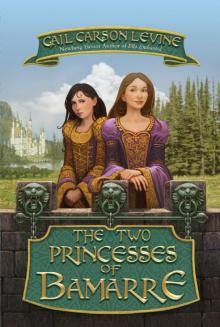 The Two Princesses of Bamarre
The Two Princesses of Bamarre Dave at Night
Dave at Night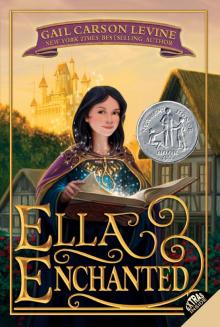 Ella Enchanted
Ella Enchanted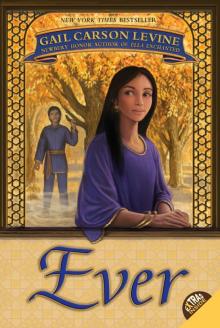 Ever
Ever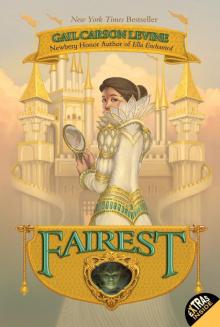 Fairest
Fairest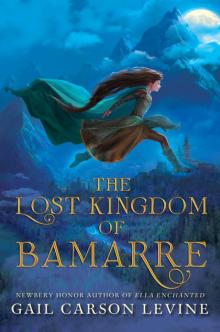 The Lost Kingdom of Bamarre
The Lost Kingdom of Bamarre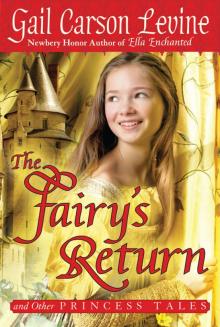 The Fairy's Return and Other Princess Tales
The Fairy's Return and Other Princess Tales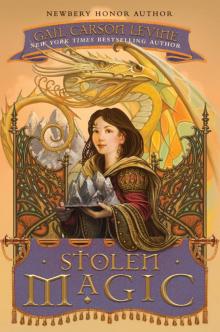 Stolen Magic
Stolen Magic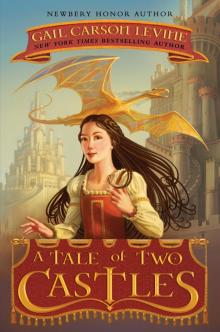 A Tale of Two Castles
A Tale of Two Castles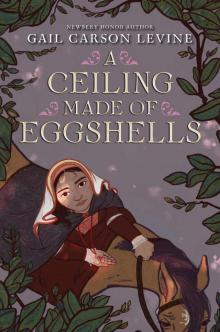 A Ceiling Made of Eggshells
A Ceiling Made of Eggshells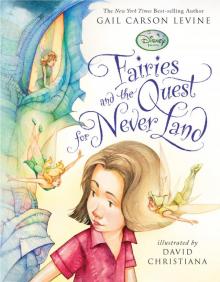 Fairies and the Quest for Never Land
Fairies and the Quest for Never Land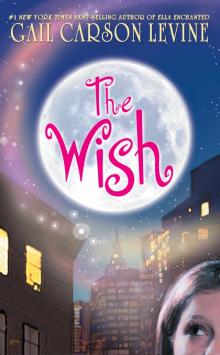 The Wish
The Wish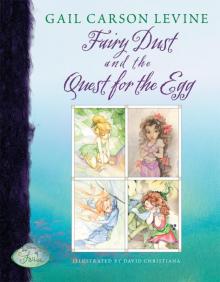 Fairy Dust and the Quest for the Egg
Fairy Dust and the Quest for the Egg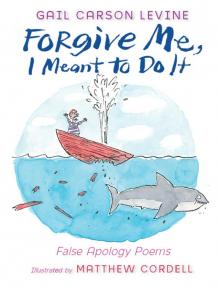 Forgive Me, I Meant to Do It: False Apology Poems
Forgive Me, I Meant to Do It: False Apology Poems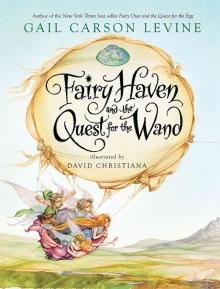 Fairy Haven and the Quest for the Wand
Fairy Haven and the Quest for the Wand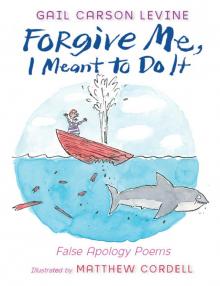 Forgive Me, I Meant to Do It
Forgive Me, I Meant to Do It